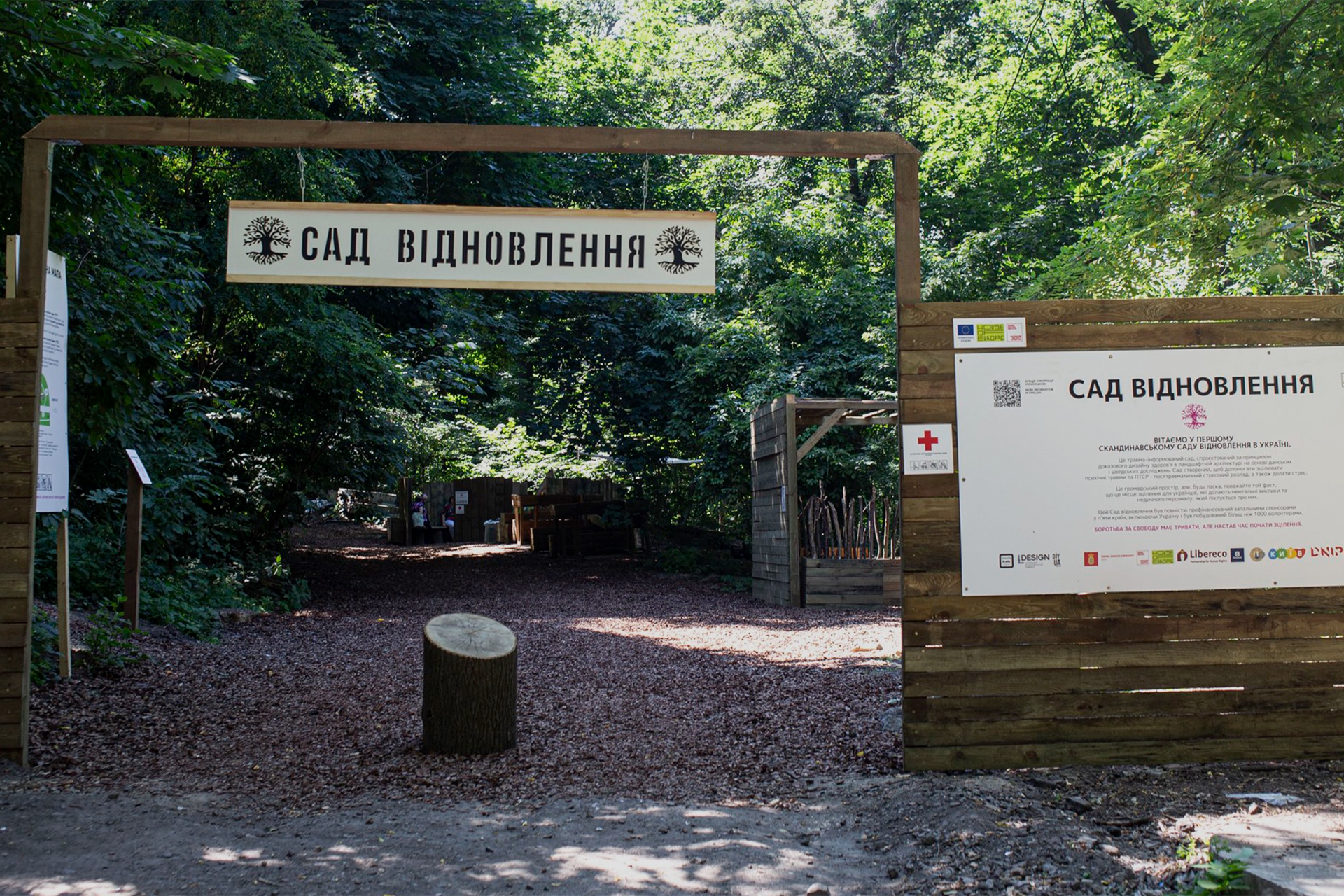Nordic Therapy Garden Kyiv
Mental Health Crisis in Ukraine
The full-scale invasion of Ukraine has led to a severe mental health crisis among its population. Civilians face constant shelling, while returning soldiers grapple with psychological disorders like PTSD. Cases of domestic violence are also on the rise, showing how trauma impacts both individuals and their communities. The country struggles with a lack of readiness to address this growing mental health epidemic.
Restorative Gardens as a Solution
Coolville Design Lab is addressing this crisis by creating Restorative Gardens — therapeutic environments designed to support mental recovery through interaction with nature. These gardens are thoughtfully crafted using calming colors, soft textures, and fragrant plants. They include quiet, secluded areas for introspection and open spaces for social interaction, helping visitors regain a sense of safety and emotional resilience.
Scientific Basis for Restorative Design
Scientific research has long recognized nature’s healing properties. Ancient Roman gardens served similar purposes, and modern studies continue to validate the mental health benefits of green spaces. Restorative gardens actively engage visitors’ senses, helping them relax and recover. They include different zones tailored to various psychological needs, from solitary contemplation to interactive spaces fostering community support.
Key Design Theories Applied
_Salutogenic Approach: This theory highlights the importance of environmental resources in combating life’s challenges. Restorative gardens serve as resilience-enhancing environments.
_Attention Restoration Theory: Natural settings reduce cognitive overload by allowing spontaneous attention, reducing mental fatigue and improving overall well-being.
_Psychoevolutionary Theory: Humans are inherently connected to nature, and natural environments reduce stress by offering familiar, evolutionarily comforting surroundings.
_Place Prospect Theory: Historical survival instincts influence human preference for environments offering both shelter and expansive views, shaping garden layout.
Strategic Plant Placement
Plants are carefully chosen and arranged to create a peaceful environment. Trees and shrubs reduce noise, block wind, and enhance privacy. Evergreen species maintain a calming atmosphere year-round, while plants with mild fragrances stimulate the senses without overwhelming visitors.
Sustainable Scandinavian-Inspired Design
The design uses durable, eco-friendly materials like reclaimed wood. Benches and seating are ergonomic and visually simple, emphasizing comfort and sustainability. Gardens feature rainwater collection systems, clear signage, and accessible pathways, ensuring functionality and long-term usability.
Tailored User Experience
Restorative Gardens accommodate diverse needs based on three user profiles:
_Inner Healing: For individuals needing seclusion and sensory comfort, offering private spaces with serene views.
_Reality Reconnection: For those needing sensory stimulation, featuring fragrant flowers, water features, and interactive zones.
_Active Engagement: For individuals benefiting from therapeutic tasks like gardening, fostering purpose and recovery through meaningful activities.
By considering psychological, environmental, and cultural aspects, Coolville Design Lab creates restorative gardens that function as healing sanctuaries. These thoughtfully crafted spaces promote mental recovery while fostering ecological sustainability and community resilience.
Coolville Design Lab operates as a nonprofit organization sustained by fundraising, volunteer work, and partnerships with prominent supporters such as Husqvarna, the City of Copenhagen, and the Ministry of Foreign Affairs of Denmark. Volunteer participation not only drives the project forward but also serves as a form of therapy, providing participants with a meaningful role and fostering community engagement.
«We have selected a plot of land in the historic Podil district of Kyiv as the location of a pilot project that will create awareness and act as a proof-of-concept. It is located right next to Pavlov Psychiatric Hospital, with 1000 patients. This garden will provide solace and healing for any citizen who needs it, as well as start the dialogue about the concept of therapy gardens in the Ukrainian context.
The land is lightly forested and is registered as a nature reserve and with low-impact interventions – both physical and visual – we will create a garden that will in effect become a new hospital ward for healing patients.»
Coolville Design Lab’s Podil pilot project has a growing number of partners and associates: NGO Kosmos Tabir | The City of Copenhagen (Kyiv Office) | Libereco.org | Danish Cultural Institute | Danish Embassy Kyiv
REFERENCES:
https://www.instagram.com/therapy.garden.ua/
https://fundrazr.com/diyukraine?ref=ab_7tVGy2Otxe77tVGy2Otxe7
(Nikita Kormysh)
Nordic Therapy Garden Kyiv
- Authors: Coolville Design Lab
- Location: Podil (next to Pavlov Psychiatric Hospital), Kyiv, Ukraine
- Year: 2022 - Present
- URL: https://www.colville-andersen.com/therapy-gardens

